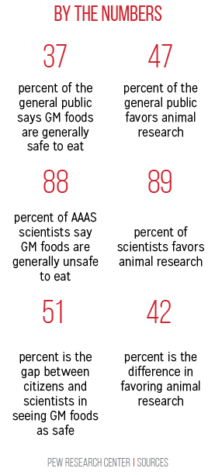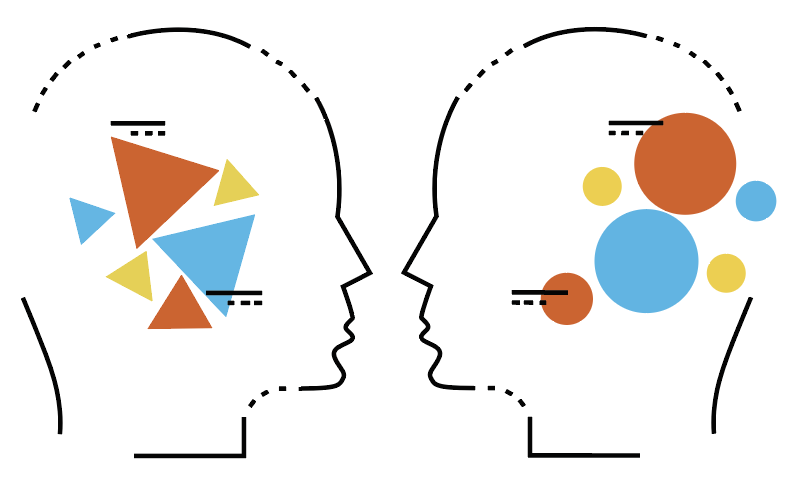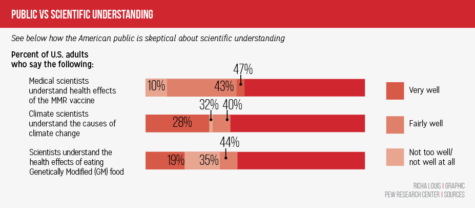There is growing discrepancy between the beliefs of the American public compared to the scientific community. For example, according to recent studies conducted in 2016 by Pew Research Center and National Aeronautics and Space Administration (NASA), 97 percent of climate change scientists believe climate change is manmade; however, only 50 percent of the public believe the same. But while it may seem like the public rejects science, Pew Research found that 75 percent of the public are supportive of science and believe there should be tax-funded research.
AP Psychology teacher Robin Pletcher said there are many reasons for people’s apparent rejection of facts.
“When looking at why people reject facts, people rarely reject them for no reason,” Pletcher said. “They might be trying to protect some aspect of themselves. Or maybe there is some kind of hidden motivation to accept something or reject something, or there might be some kind of coping strategy that is involved. For instance, if somebody has something that causes them distress, maybe they try to avoid topics that would cause them to remember that thing. So if there’s a certain topic of shots causing illness or disorders or diseases in children, they are aware of the situation. Maybe they know of a child who has dealt with that illness or disease, if that illness causes them pain or distress they might just kind of want to avoid any topics surrounding that. So when they see information that’s out there that’s supporting (the illness or disorder) or not supporting, they just shut down and avoid (the research).”
Talha Ahmad, debate team officer and senior, said people disagree with facts when their values are more important to them.
He said, “The difference in believing something comes down to what values people hold more important. You might be able to show a person scientific evidence or facts but they might have a value that they consider more important than the fact being presented and reject it.”
Allison Malloy, AP Capstone Seminar and Research teacher, said not every fact needs to support one side of an argument.
“I think that a really educated person, a really mature person, whether in our school or outside of school, is going to recognize that not every fact supports their belief,” Malloy said. “I think it takes sophistication to recognize that when a fact does not support my belief it doesn’t make my belief wrong. It doesn’t necessarily make me right and them wrong if I ignore it. But someone really sophisticated is going to say, Okay, well this fact is true, and they will try to prove it not true,” Malloy said. “I do think the idea of ignoring facts is a product of not being at that point where you feel confident in yourself to embrace the other side and use the other side to further define your stance.”
Pletcher said it is not easy using information to convince someone to change their mind if they reject many facts that disagree with their viewpoint.
“You can try to show them facts, but unfortunately if somebody believes something they tend to ignore anything that doesn’t support their beliefs and they’re only going to believe facts that support their beliefs,” she said. “I could think that the sky is yellow and anytime you show me any facts that say the sky is blue I’m just going to ignore them and only look at instances where it only shows a yellow tint, and I’m going to think your facts are wrong and my facts are right.”

While Ahmad said he agrees it is hard to change the minds of people who dismiss facts, he said there are ways that are more effective ways to persuade those people than just using facts.
“The best way usually in debate when (people dismiss facts), is that you try to get into their way of thinking and the value system they believe and you try to sway it to your side,” Ahmad said. “You should show how the facts fit in with their worldview.
“For instance,” he added, “if someone said they didn’t want to vaccinate their children because of privacy concern and they really value privacy a lot, you could say not being vaccinated could lead to your (child) getting more diseases and eventually your child will have to go to the hospital. And that could potentially be more of a privacy violation if they keep going to the hospital. So in that case, when you weigh the benefits and negatives of vaccines you might be able to convince the person in terms of privacy standpoints it’s better to get the vaccines now than continuous visits later in life.”
For people who reject commonly held beliefs, Malloy said she encourages them to find out for themselves if there are facts supporting their beliefs.
She said, “You should conduct your own research and actually try to validate it. For example, if you were very against climate change being real, you can dedicate your time to proving it. Do your own methodology, conduct our own findings, see what you find even if you’re not in a place where you can do that right now. It’s a matter of being able to research at some point. We shouldn’t and aren’t in a position where we can ever know everything about everything.”


































![British royalty are American celebrities [opinion]](https://hilite.org/wp-content/uploads/2024/03/Screenshot-2024-03-24-1.44.57-PM.png)


















![Review: “Suits” is a perfect blend of legal drama and humor [MUSE]](https://hilite.org/wp-content/uploads/2024/04/unnamed-1.png)
![Chelsea Meng on her instagram-run bracelet shop [Biz Buzz]](https://hilite.org/wp-content/uploads/2024/04/IMG_2446-1200x838.jpg)
![Review: Quiet on Set: The Dark Side of Kids TV is the long awaited exposé of pedophilia within the children’s entertainment industry [MUSE]](https://hilite.org/wp-content/uploads/2024/04/unnamed.jpg)
![Review: “The Iron Claw” cannot get enough praise [MUSE]](https://hilite.org/wp-content/uploads/2024/04/unnamed.png)
![Review: “The Bear” sets an unbelievably high bar for future comedy shows [MUSE]](https://hilite.org/wp-content/uploads/2024/03/unnamed.png)
![Review in Print: Maripaz Villar brings a delightfully unique style to the world of WEBTOON [MUSE]](https://hilite.org/wp-content/uploads/2023/12/maripazcover-1200x960.jpg)
![Review: “The Sword of Kaigen” is a masterpiece [MUSE]](https://hilite.org/wp-content/uploads/2023/11/Screenshot-2023-11-26-201051.png)
![Review: Gateron Oil Kings, great linear switches, okay price [MUSE]](https://hilite.org/wp-content/uploads/2023/11/Screenshot-2023-11-26-200553.png)
![Review: “A Haunting in Venice” is a significant improvement from other Agatha Christie adaptations [MUSE]](https://hilite.org/wp-content/uploads/2023/11/e7ee2938a6d422669771bce6d8088521.jpg)
![Review: A Thanksgiving story from elementary school, still just as interesting [MUSE]](https://hilite.org/wp-content/uploads/2023/11/Screenshot-2023-11-26-195514-987x1200.png)
![Review: When I Fly Towards You, cute, uplifting youth drama [MUSE]](https://hilite.org/wp-content/uploads/2023/09/When-I-Fly-Towards-You-Chinese-drama.png)
![Postcards from Muse: Hawaii Travel Diary [MUSE]](https://hilite.org/wp-content/uploads/2023/09/My-project-1-1200x1200.jpg)
![Review: Ladybug & Cat Noir: The Movie, departure from original show [MUSE]](https://hilite.org/wp-content/uploads/2023/09/Ladybug__Cat_Noir_-_The_Movie_poster.jpg)
![Review in Print: Hidden Love is the cute, uplifting drama everyone needs [MUSE]](https://hilite.org/wp-content/uploads/2023/09/hiddenlovecover-e1693597208225-1030x1200.png)
![Review in Print: Heartstopper is the heartwarming queer romance we all need [MUSE]](https://hilite.org/wp-content/uploads/2023/08/museheartstoppercover-1200x654.png)






















![Review: Ladybug & Cat Noir: The Movie, departure from original show [MUSE]](https://hilite.org/wp-content/uploads/2023/09/Ladybug__Cat_Noir_-_The_Movie_poster-221x300.jpg)

![Review: Next in Fashion season two survives changes, becomes a valuable pop culture artifact [MUSE]](https://hilite.org/wp-content/uploads/2023/03/Screen-Shot-2023-03-09-at-11.05.05-AM-300x214.png)
![Review: Is The Stormlight Archive worth it? [MUSE]](https://hilite.org/wp-content/uploads/2023/10/unnamed-1-184x300.png)


![Seniors Jillian Rang and Athul Ramkumar practice their presentation at the DECA state competition on March 5, 2024. Arya Patel, DECA paper head and junior, said, As they [students] begin to make their final preparations, its important to remember that making it to this point is an incredible achievement.](https://hilite.org/wp-content/uploads/2024/04/IMG_8285-1200x800.jpg)

